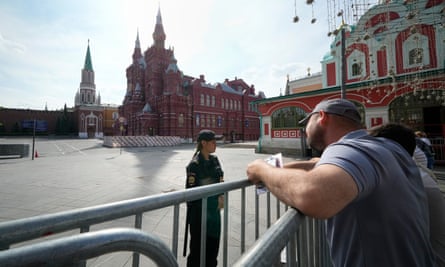[ad_1]
Russia’s defence minister has appeared on state TV and emergency counterterrorism measures have been cancelled in Moscow and surrounding regions as the Kremlin seeks to restore calm following Yevgeny Prigozhin’s failed mutiny.
The defence ministry released footage on Monday that it claimed showed Sergei Shoigu “visiting the forward command post of one of the formations of the ‘Western’ group of troops”. In the video, Shoigu is shown riding in a vehicle and arriving at a command post, where he listens to reports from officers and pores over a battlefield map.
If confirmed, the footage would be the first sighting of Shoigu since Prigozhin, the leader of the Wagner mercenary group, declared war on him and his ministry on Friday.
However, the video was released without sound and it was unclear when and where it was filmed. Russian news agencies have in the past released pre-filmed segments called “preserves”, attempting to show that officials including Vladimir Putin were working in the Kremlin when they could be hundreds of miles away.
Nonetheless, the footage showed tacit government support for Shoigu, whom Prigozhin had sought to oust with his uprising.
On Saturday, Prigozhin had claimed Shoigu had fled Rostov before his Wagner fighters took control of the Southern Military District command. In extraordinary footage from the military headquarters, he strong-armed a deputy defence minister into an on-camera debate and called on Shoigu and the chief of the general staff, Valery Gerasimov, to meet him in Rostov.

Moscow city, Moscow region, and Voronezh region officials have announced they will end counterterrorism regimes introduced on Friday, when it appeared the country was on the brink of civil war.
As Prigozhin’s Wagner mercenaries moved on Moscow on Saturday, officials introduced severe restrictions meant to keep the public off the streets and allowing officials extraordinary powers to detain Russians or commandeer private vehicles in case they deemed it necessary.
Law enforcement agencies ordered evacuations of major cultural institutions including the Pushkin museum and GES-2 cultural centres, Gorky Park and others, cancelled cultural and musical events and introduced a blanket ban on public events.
Troops have also been dismantling barricades and repairing roads blocked with anti-tank traps set up to stop the Wagner convoy, as a sense of uneasy normalcy returned to the Russian capital on Sunday.
Prigozhin has repeatedly blamed Shoigu and Gerasimov for his fighters’ deaths in Ukraine. The Wagner chief has not been seen or heard from since he left Rostov with his troops on Saturday evening with an apparent deal offering him amnesty and exile in Belarus.
The Russian state news agency RIA Novosti, citing security sources, reported on Monday that the criminal investigation into Prigozhin for organising an armed mutiny was still being investigated by the FSB security services.
The Kremlin had said that Prigozhin had Putin’s guarantee he could go into exile in Belarus and that the criminal case would be scrapped.
A television segment on the Sunday evening show Moscow. Kremlin. Putin also featured the Russian president in his first appearance since he addressed the nation on Saturday morning, where he called the mutiny “internal treason” and said he would “not allow a civil war.” The Sunday night spot appeared to be pre-filmed, with Putin discussing his daily routine and giving no comments on the largest armed uprising in recent Russian history.
The conflict between Prigozhin and Shoigu was at the centre of the weekend’s mutiny.
“I don’t think that this was an attempt to replace Putin,” said Rob Lee, a US-based expert on the Russian military. “I think basically this was a factual dispute between two important Russian figures that became a challenge to Putin, which is the abnormal part of this.”
The Russian ministry of defence had demanded that all paramilitary units, including Wagner, sign contracts that would de facto put them under military control. Details of the agreement between Prigozhin and the Kremlin remain unclear, including the fate of his Wagner mercenaries, which number in the thousands.
Lee said Prigozhin’s capture of a major city and dressing-down of senior military officers, including a deputy minister of defence, had “undermined Russian state control”.
“I don’t know that there’s going to be a direct effect on the battlefield, because Wagner was not playing a role currently on the battlefield. They were replaced in Bakhmut in early June, and I don’t know that they have any guys on the frontlines.”
[ad_2]
Source link
